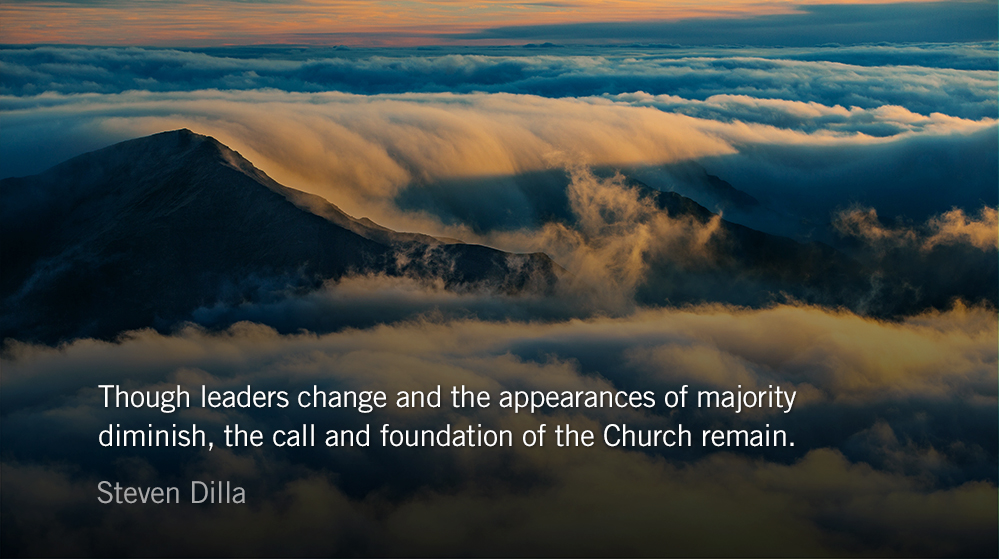“Christians in the first-century were a minority in a hostile world,” observed John Howard Yoder. A theologian and ethicist, Yoder believed that ancient Christianity’s minority status was radically different than the posture every Western Christian after Constantine would embrace. This historic standard is part of why the rapidly diminishing power of cultural Christianity in the U.S. has been so traumatic.
The Church, prior to Constantine, was defined by outward character and practice. Constantine effectively conscripted the West into Christianity—demanding they appear as Christian, or face brutal consequences for defiance. Because everyone essentially held the same external practices, the identity of a true Christian shifted inward, to the transformation of the heart and soul.
Over time the external signs of faith became less and less valued—until even the efficacy of an external sign was questioned. Yoder follows the logic of a modern Christian debating giving away all of his wealth:
What would happen if everyone did it? If everyone gave their wealth away what would we do for capital? If everyone loved their enemies who would ward off the Communists?
This argument could be met on other levels, but here our only point is to observe that such reasoning would have been preposterous in the early church and remains ludicrous wherever committed Christians accept realistically their minority status. For more fitting than “What if everybody did it” would be its inverse, “What if nobody else acted like a Christian, but we did?”
In many ways, the faithful Christians celebrated throughout history are the ones who defied Yoder’s calculated control of external works of faith. “Anyone who has read Eberhard Bethge’s Dietrich Bonhoeffer: A Biography knows it is impossible to distinguish between Bonhoeffer’s life and work,” writes theologian Stanley Hauerwas:
Bonhoeffer’s work from beginning to end was the attempt to reclaim the visibility of the church as the necessary condition for the proclamation of the gospel in a world that no longer privileged Christianity.
Hauerwas notes that, not only was Bonhoeffer’s faith deeply integrated into his life, but, “Bonhoeffer’s life that was at once theological and political.” Quoting from The Cost of Discipleship, Hauerwas continues:
According to Bonhoeffer sanctification, properly understood, is the church’s politics. For sanctification is only possible within the visible church community. “That is the ‘political’ character of the church community. A merely personal sanctification which seeks to bypass this openly visible separation of the church-community from the world confuses the pious desires of the religious flesh with the sanctification of the church-community, which has been accomplished in Christ’s death and is being actualized by the seal of God.”
Bonhoeffer saw that the holiness of the church is necessary for the redemption of the world.
Though Bonhoeffer saw American theology as superficial, he has many followers currently echoing his ethos for Christian praxis. A New Yorker profile on the Southern Baptist ethicist Russell Moore noted, “he says that Christians in America must learn to think of themselves as a marginal community, struggling to survive in an increasingly hostile secular culture.”
Moore tends toward introspection, admonishing Southern Baptists to think first—and often—about their own sins. The denomination was formed, in 1845, by white Southerners who split off from a national Baptist movement that was growing increasingly intolerant of slavery. Moore sees in his theological ancestors a cowardly and catastrophic willingness to ignore the uncomfortable. “If you call people to repentance for drunkenness, or for adultery, or for any number of personal sins, but you don’t say anything about slaveholding or about lynching,” he says, “you’re just baptizing the status quo.”
Though leaders change and the appearances of majority diminish, the call and foundation of the Church remain. Hauerwas, again quoting Bonhoeffer, concludes:
The church names that community that lives in radical hope in a world without hope. To so live means the church cannot help but be different from the world. Such a difference is not an end in itself but “automatically follow[s] from an authentic proclamation of the gospel.”
Weekend Reading List
- Dietrich Bonhoeffer’s Political Theology. Stanley Hauerwas for The University of Waterloo.
- The New Evangelical Moral Minority. Kelefa Sanneh for The New Yorker.
- A White Church No More. Russell Moore for The New York Times.
- The Priestly Kingdom (pp. 42-45, draft provided by Duke). John Howard Yoder in Christian Ethics.
Today’s Reading
Hosea 10 (Listen – 2:47)
Psalms 129-131 (Listen – 2:43)
This Weekend’s Readings
Hosea 11 (Listen – 1:53) Psalms 132-134 (Listen – 2:42)
Hosea 12 (Listen – 1:51) Psalms 135-136 (Listen – 4:23)






